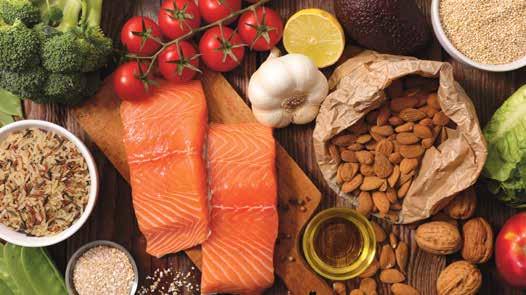
2 minute read
Eat well and stay healthy
Hygiene still matters
With little community spread, Victoria has been able to enjoy a COVID-normal state for a few months. Although this is good news, it’s easy to become complacent and stop doing our good hygiene practices. When you are well: • wash your hands often with soap and water. This includes before and after eating, blowing your nose and after going to the toilet.
Advertisement
Wash your hands thoroughly for at least 20 seconds • cough or sneeze into a clothed elbow and dispose of any tissues in the bin • use alcohol-based hand sanitisers when you can’t use soap and water • clean and disinfect surfaces you use often such as benchtops, desks and doorknobs. In a fire station you might extend this to frequently-touched parts of your brigade vehicles – steering wheel, gear stick, door handles, mirrors, and any equipment you use • clean and disinfect objects you use often such as mobile phones, keys, wallet and work access passes • increase the amount of fresh air by opening windows or changing air conditioning. But remember to secure the premises before leaving. When you are sick: • it’s important that you stay at home. You should also continue to practise good hygiene using the tips above. • if you have cold or flu-like symptoms, even if those symptoms are mild, get tested for COVID-19 and follow the directions given until you receive the all-clear. Even if your results are negative, maintain your good hygiene habits and keep your distance from others.
STORY KATIE WILLIAMS
Eat well and stay healthy
The food we eat has a big effect on our health and quality of life. Although eating healthily can be fairly simple, the rise in popular ‘diets’ and dieting trends, and conflicting information understandably causes confusion. Making positive health changes and living a healthier lifestyle improves your chances of staying healthy as you get older. The Australian Guide to Healthy Eating, which you can read on the eatforhealth. gov.au website, provides up-to-date advice about the types and amount of foods that we need to eat for our health. Eating a variety of foods from the five major food groups will give your body a range of nutrients that can help reduce the risk of diseases and keep your diet interesting and varied. Recommendations for healthy eating: • Eat a wide variety of foods from the five major food groups including: - at least two serves of fruit every day - at least five serves of vegetables, pulses or beans every day - grains and cereals, preferably whole grains such as wholemeal bread, brown rice, oats and barley
48
- lean meat, poultry, fish, eggs, beans, tofu, nuts, seeds - milk, cheese, yoghurt or alternatives • Limit discretionary or junk foods and beverages – these are typically high in added salt or sugars, saturated fats and have low levels of important nutrients • Include unsaturated (healthy) fats such as fish, nuts and avocados • Stay hydrated and choose water as your main drink. The Eat For Health government website has a lot of useful information including healthy recipes and how to understand food labels.










